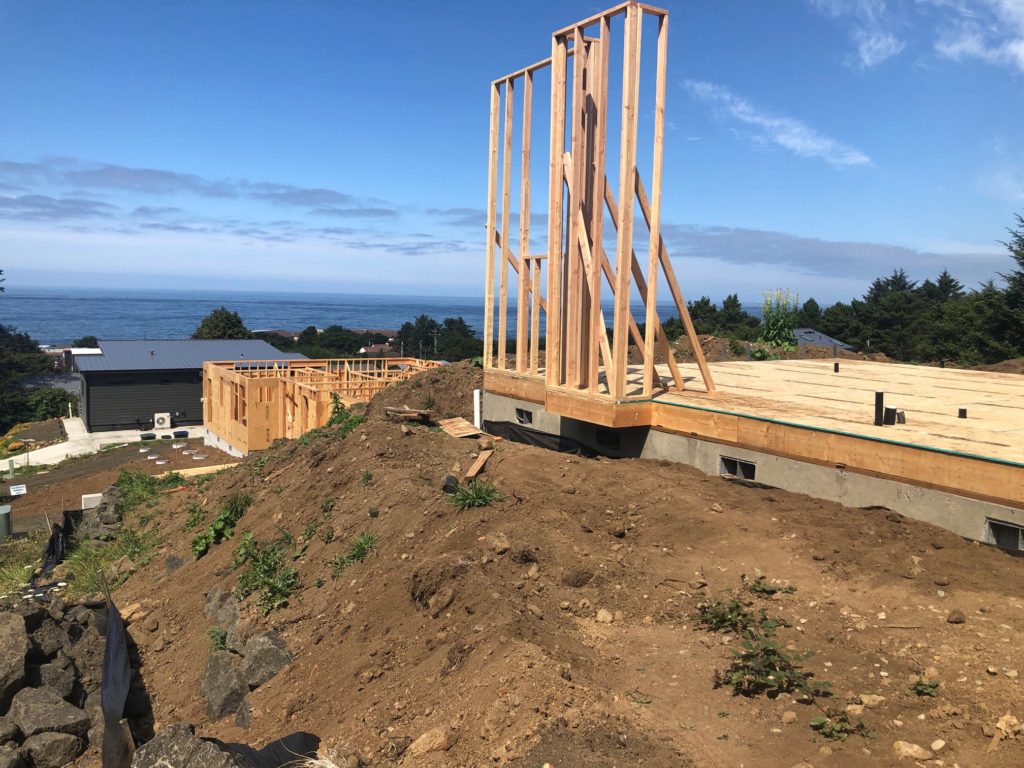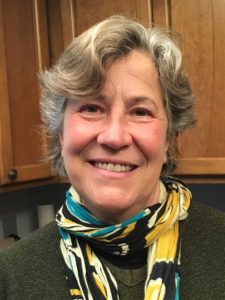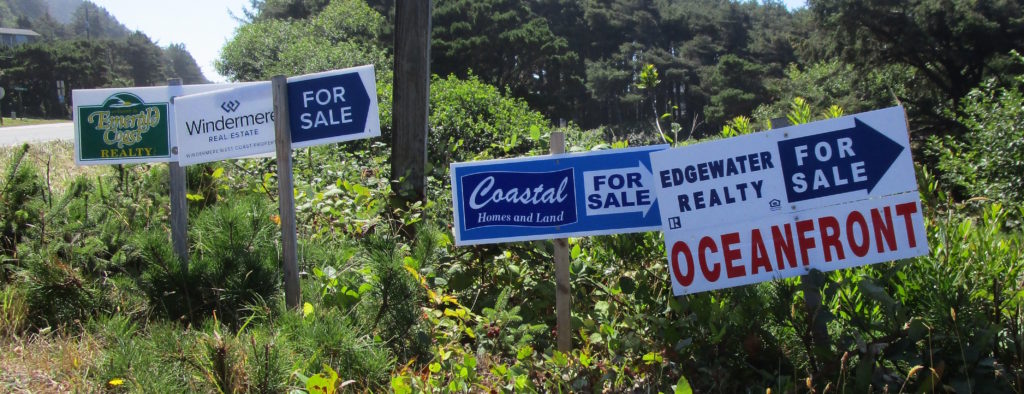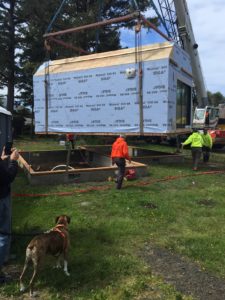
By CHERYL ROMANO/YachatsNews.com
YACHATS — Call it a shortage. Call it a crisis. Call it even “not my problem” if you like. But like it or not, Yachats has a housing issue that affects almost everyone.
Now, thanks to two state grants totaling $73,000, work has started to see exactly where and how the city might help boost the number of places to live.

“If we want to stay ahead of the growth in Yachats, and maintain a semblance of what everyone loves about the city, then we need to plan,” said Planning Commission member Jacqueline Danos. “Before you can plan, you need the data. That’s what we’re doing with this.”
“This” is a project funded by the Oregon Department of Land Conservation and Development to do two things — gather data on existing structures and land in the city, and get public views on how to move forward.
Danos and fellow Planning Commission member John Theilacker applied for the grants. Cascadia Partners of Portland has started work on gathering and sorting the data. The work has no formal name, but Yachats Housing Planning Project is apt.
Cascadia will produce geographic information system maps of Yachats to “give us an updated zoning map, and see clearly where we stand — what’s been built, where, and what’s open,” said Danos.
The GIS maps can feature “layers” to show streets, buildings and even vegetation. Yachats’ map will be a basic one to provide an updated snapshot of current zoning. While the city currently has no such GIS maps, Lincoln County does, and that information, or “data sets” will be compiled and analyzed by Cascadia, which specializes in urban planning, real estate, environmental sustainability and public engagement.
“GIS mapping is based on coordinates — like the little blue dot on your cellphone to show where you are,” said Rachel Cotton, Cascadia’s representative on the project. Other components of the data collection include population demographics, growth, and income levels provided for (or not) in current housing.
Census figures show that between 2010 and 2020, Yachats’ population grew from 690 to 994 people, an increase of 44 percent. As Danos noted in a letter applying for the project funds last summer, “Businesses, including the City itself and the Post Office, are struggling to fill vacancies due to a lack of housing in various sizes, types and levels of affordability.”

A Yachats “building inventory”
Once the Yachats GIS map is completed, “You could zoom around, like on Google Earth” to see boundaries of tax lots, or the location of wetlands, Cotton said. While there’ll be no 3-D modeling of the entire city, the map is a key part of the data collection, called a housing needs analysis.
“The housing needs analysis will be literally a building inventory,” said Danos. “Cascadia will tell us, for example, ‘The city has XX buildable lots. Of those XX percent are zoned single-family residential, or R 2-4, or commercial.”
Timeline for the project, which began in February, calls for the needs analysis to be completed in September. The analysis will be used to determine if Yachats has enough land zoned for housing to meet expected needs for the next 20 years.
If the city decides to move forward, next step is a “housing implementation plan,” that would be completed in the summer of 2023.
If the Planning Commission and City Council adopt both the assessment and implementation plans, potential areas for change include zoning codes, rezoning certain areas, and applying to the state for an expansion of the urban growth boundary.
Public will get to comment
Both Danos and Cotton stressed the importance of what they call “public engagement” on the project.
Once the data has been collected, two public meetings will be scheduled in June or July and in the fall, for residents to ask questions and voice any concerns about the project.
“People want to know ‘What does this mean for me? What’s going to happen in my neighborhood as a result of this information?’” said Cotton, a certified planner and senior associate at Cascadia. She urged interested people to check the city website and YachatsNews.com for notice of the summer meeting.
“Yachats has never done anything like this,” said Danos, who will deliver project updates at monthly Planning Commission meetings.
Cascadia expects to offer initial data in April to the commission and council. “Then, we hope to start outreach in the community and encourage everyone to come and comment,” Danos said.
The plan is to also reach out to “people who work here, but can’t afford to live here,” said Danos. “Those are voices you rarely hear from — they’re too busy and often not even asked.”
To that end, she hopes to speak with employees of local hospitality businesses to get their thoughts.
Legislative mandate with money
The impetus for the grants behind the Yachats project is House Bill 2003, passed by the 2019 Oregon Legislature. It requires cities with more than 10,000 people to conduct a housing need assessment to plan for the future. So why is Yachats, with under 1,000 residents, doing this now?

“I had been keeping my eye out for funding for smaller cities,” said Hui Rodomsky, the south coast regional representative in Newport for the Oregon Department of Land Conservation and Development. “I want to help our region.”
Rodomsky contacted the city urging action on the grants last summer. When she got no response she contacted Danos, who “started the wheels rolling.”
Some 15 south coastal cities — including Waldport and Florence — have received the state housing study grants.
Asked why she pushed for Yachats and other communities to take advantage of the grants, Rodomsky said “Number one, the funding doesn’t come every day to small cities; Number two, the housing crisis is throughout Oregon. We need to understand the picture better so we can make adjustments.”
One factor in Yachats’ project is the urban growth boundary, which all Oregon cities are required to adopt.
“You can only ‘urbanize’ (provide sewers) within the urban growth boundary,” said Rodomsky. “Yachats’ city limits and UGB coincide — it’s already filled out.”
With a housing needs analysis, if the city of Yachats says the city needs to expand the urban growth boundary, this project “is the first step of getting there,” she said.
Another option might be to “increase the density of use to allow more housing units” within the current boundary, Rodomsky said.
In the end, residents, owners of second or vacation homes, the Planning Commission and ultimately the City Council will have to discuss and decide.
“You can talk ‘til you’re blue in the face about what we need, but unless you know where we stand, we don’t know anything,” Danos said. “We need the data.”
- Cheryl Romano is a Yachats freelance reporter who contributes regularly to YachatsNews.com. She can be reached at Wordsell@gmail.com



This article seems directed at some agenda that is undisclosed.
Here’s the opening paragraph: “Call it a shortage. Call it a crisis. Call it even “not my problem” if you like. But like it or not, Yachats has a housing issue that affects almost everyone.” I admit I’m a newcomer to the city (moved here in October of 2020) but with those neighbors and folks I’ve met in town, I’ve never heard anyone say that housing is a “crisis,” “problem,” or “issue.”
I’ve also not heard anyone complain that there is a need to “boost the number of places to live.”
Personally, I like the small-town nature of Yachats and do not see any need to rush into “urbanizing” the beaches. Rows of apartments are not going to make the city more attractive and will likely bring problems that this “study” will avoid.
What is the agenda behind this funding? Who has pressured the state to fund such studies? How come none of this is disclosed in the article?
Even the name of the department behind the study is odd – the Oregon Department of Land Conservation and Development. How can one conserve and develop at the same time?
Furthermore, I don’t buy into Planning Commissioner Jacqueline Danos’s reasoning at all: “Businesses, including the City itself and the Post Office, are struggling to fill vacancies due to a lack of housing in various sizes, types and levels of affordability.” Basic economics teaches that the way to fill job vacancies is to raise wages. Higher wages might also increase a worker’s ability to live in Yachats.
I don’t know about others, but I believe the population density of Yachats is reasonable. Yet I can easily see how government subsidized multi-family housing would put a strain on basic services, streets, sewers, parking, emergency, and police services, etc., and basically lower the quality of life many of our residents have come here to enjoy.
While the study will go forward, I for one plan to show up at the public meetings in June and July and voice my concerns. I also believe that citizens will oppose any changes to the zoning that could affect their property values negatively. It has been my experience that changes in zoning to encourage population density negatively affect existing properties.
The answer is quite simple, without an analysis. There is a shortage of long term rentals because the owners can make more money having them as short term vacation rentals. Take away that profit margin and the situation may change. Before Vacasa, Sweet Homes, Air B&B, and VRBO we did not have a housing crisis here. There should be a big tax slapped on all of these sorts of arrangements and a tax break given to those who actually live in their primary homes, or provide long term housing to others.
I was wondering why a “study” costs $73,000 and what exactly will the grant money be spent on? What exactly is purchased with the $73,000? This is a sincere inquiry. Study seems vague.
Dear City Planners,
This is the first question: What percentage of our housing stock is short-term rentals?
A suggestion: Pass a temporary suspension of licensing at your next meeting until the Study is completed. Avoid Lincoln County’s approach of waiting until the inventory of STRs went from 389 in January 2019 to 601 by March 4, 2022 when the Commissioners passed Resolution 20-4-3B for a temporary suspension of licensing “… in order to undertake a review of licensing standards, program operations, enforcement actions and full implementation of new provisions of the licensing program for short term rentals of residences (STRs), Lincoln County Code (LCC) Sections 4405 and 4.460 …”